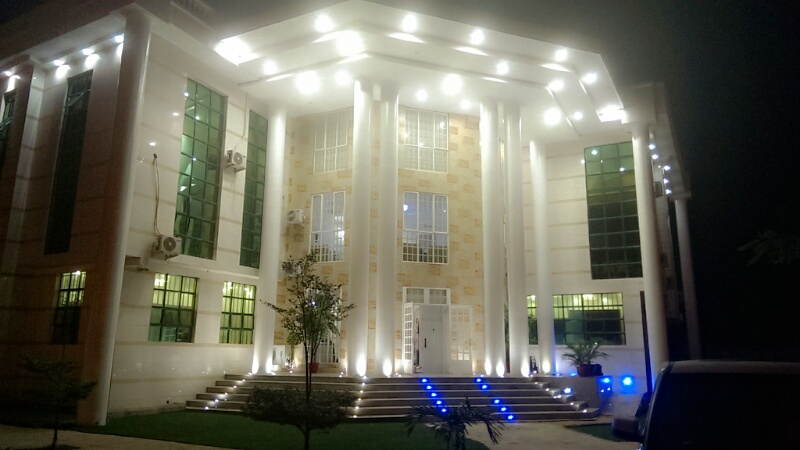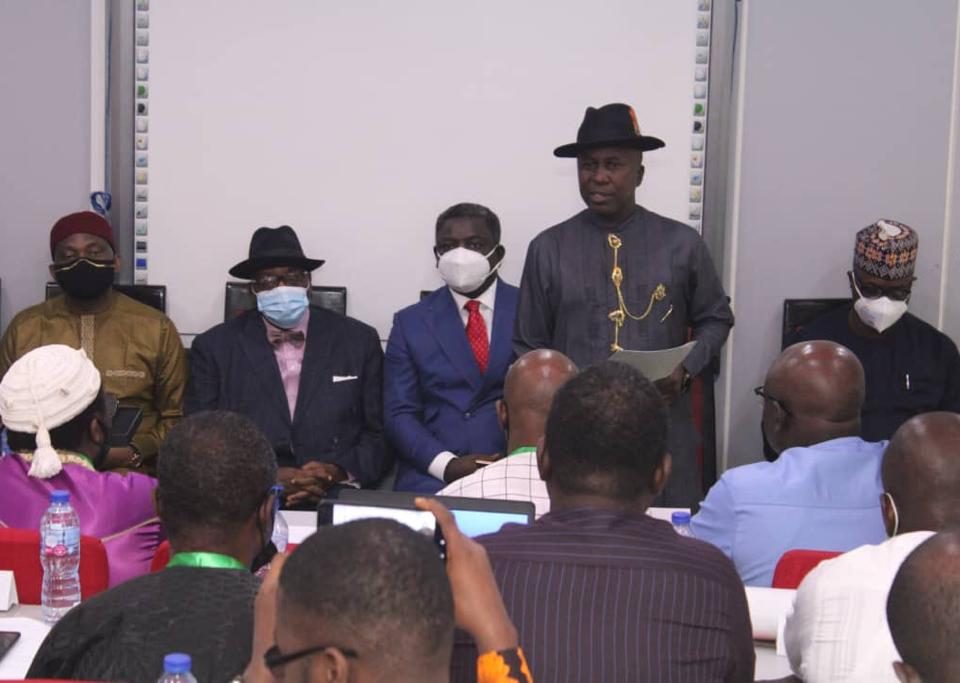ADDRESSING THE INEQUALITY OF MINORITY COMMUNITIES – Chamberlain S. Peterside, Ph.D
May 23, 2014
MBGN 2014 visits Azaiki Public Library
July 11, 2014- THE GUARDIAN, Saturday, 07 June 2014
- Written by Dele Agekameh
TODAY, right at the heart of Yenagoa, the bubbling capital city of BayelsaState, stands an imposing and alluring architectural edifice, the Azaiki Public Library, ostensibly the first private initiative of that nature in the country.
In its concept, execution and functionality, the library can stand its own among world-renowned libraries. The library was set up in the mould of the John F. Kennedy Library in Boston, the Jimmy Carter Library in Atlanta, the Ronald Reagan Library in Los Angeles, the Clinton Library in Little Rock, Arkansas, the Library of Congress – all in the United States; and the British Public Library in London, to name a few. It is complete with a World Class Public library, an e-library, Arts Galleries, Coffee Bar, Lecture Halls, Conference Halls, Exhibition Hall and many others.
However, one feature of this library, which makes it unique, is the existence of the Niger Delta Museum on its third floor. The Museum tells the story of the Niger Delta Region, particularly the Ijaw Nation. In vivid illustrations, literature and quotations emblazoned everywhere, it chronicles the travails of a people because of the “curse” imposed on them by the discovery of oil in their bowels many years ago which later crystallised into the exploration and exploitation of oil from the region since 1956.
A striking feature of the Museum is the section devoted to Ken Saro-Wiwa, the late environmentalist and human rights activist who was murdered through the instrumentality of a callous judgment by a Kangaroo court in November, 1995. The history of that judicial murder, which shook the world to its foundation, is replicated in a beautiful illustration, which featured the gallows where Sarowiwa was finally silenced. That section is adorned with replicas of the last clothes worn by the late environmentalist and other instruments of his gory execution.
Last Monday, Prof. Steve Azaiki, the initiator of the Library and Museum, took his august visitors who had congregated in Yenagoa for his birthday celebration round the complex. It was a breath-taking, guided tour, which set tongues wagging about how this great Nigerian came about the idea to set up such a magnificent edifice. In an age where people will rather build hotels or other commercial centres for money making, what baffled the audience which included the State Governor, Chief Seriake Dickson, captains of industries, renowned public figures and academic gurus, was that the whole idea is not a commercial venture but something to galvanise humanity to find succour for their thirst for learning.
According to Azaiki, “the idea was conceived in 1999 to provide opportunity for young and old Nigerians to have access to books, to create a platform for people to visit, even if they were not interested in reading, and to serve as tourists’ attraction. And rightly so, the place is fast becoming a Mecca not just for those sight-seeing but for those in quest of e-learning. At the moment, the Vice-Chancellors of the Federal University, Otuoke, and the Niger Delta University in Amassoma, both in Bayelsa State and the Federal University of Technology, Akure, Ondo State, who were present last Monday have all indicated their willingness to partner with the library through the signing of Memorandum of Understanding, MOU.
Last Monday’s ceremony at the Library which was chaired by Navy Captain Caleb OmoniyiOlubolade, the immediate past Minister of Police Affairs and former Military Administrator of Bayelsa State was the third in the series of activities lined up to sensitise the public before the gates of the complex are finally thrown open later in the year. It featured a lecture with the theme: “Food Security and Poverty Alleviation in Nigeria.” It was brilliantly delivered by the Guest Lecturer, Professor AdebiyiDaramola, the Vice-Chancellor of the Federal University of Technology, Akure.
Some eminent Nigerians were also conferred with deserving awards. They include Senator AmatareZuofa, a Senator of the First Republic who represented old Rivers State’s three senatorial districts between 1979 and 1983; Dr. Gabriel ImomotimiGbaingbainOkara, a writer of world eminence; Dr. AbiyeSekibo, an accomplished politician, medical doctor, entrepreneur and a former Minister of Transport; Chief Rufus Ada-George, former Executive Governor of old Rivers State; Prof. Ebiegberi Joe Alagoa, a Professor of History and Chairman of the Governing Board of the Rev. D. O. Okiya College of Theology and Management Science, Emeyal, Bayelsa State
The concept of the Azaiki Foundation and Public Library is encapsulated in the opening paragraph of its mission statement: ‘To Create an enabling environment that will harness intellectual and material resources required for the generation of innovative ideas and the pursuit of life-long learning…”
By and large, the life of Azaiki reminds one of the story of the Blind Men of Hindustan and The Elephant. Six blind men are asked by a king to determine what an elephant looks like by feeling different parts of its body. The blind man who touches a leg says the elephant is like a pillar. The one who runs his palm on the tail says the elephant is like a rope. The one who holds the trunk says the elephant is like a tree branch and the one who feels the ear says it is like a hand fan; the one who touches the belly says the elephant is like a wall; and the one who feels the tusk says the elephant is like a solid pipe.
The king explains to them: “All of you are right. The reason every one of you is telling it differently is that each one of you touched the different parts of the elephant. So, actually the elephant has all the features you mentioned.”
This, to a large extent, can apply to Azaiki. People who met him in the area of his field of study will say he is an agricultural scientist, working day and night to provide better crop yield so that his nation would not go hungry. Others, however, see him as an administrator, academic, politician, environmentalist, public servant, consultant, author and boardroom player.
Why individuals will wager with their salaries about the actual description of Azaiki is because, in each area, he has always demonstrated uncommon expertise. This trait does not however come from a vacuum; it is the product of an intellectually sound mind. In other words, Azaiki parades an intimidating resume.
An indigene of Yenagoa, Bayelsa State, Nigeria, Azaiki attended Bishop Dimieri Grammar School, Yenagoa, finishing in 1978 with Grade 1, a rare feat in those days. Such precocious kids are easily fished out by the authorities. No wonder, that through a Federal Government Scholarship, he proceeded to Moldavian Agricultural Institute, Kishinev in 1980 after which he moved to the Ukrainian Agricultural Academy, Kiev, where he bagged Master of Science degree in Agronomy (Plant Protection) in 1986. Before graduating from the University, he got an award in 1984 as Best International Student. He also won a USSR Academy of Science Research Grant for Study on the Effect of Biological Protection of the Soya Bean Disease between 1985 and 1986.
Prof Azaiki commenced his Ph.D (Agriculture) in 1988 at the same Ukrainian Agricultural Academy, Kiev and received a Doctor of Philosophy in Agriculture in 1992. During his stay at the University, he obtained a Certificate in Russian Language. He added an MBA in Project Management from Federal University of Technology, Owerri, in 2001. Over the years, he has attended courses in Harvard, ‘Leadership for the 21st Century: Chaos, Conflict, and Courage’, John F. Kennedy School of Government, Harvard (2005), Education and Development”: A Roundtable Class, Oxford University, Britain (2005), Black Policy Conference (International Policies and Diplomacy Networking), Harvard University, John F. Kennedy School of Government, Executive Education (2006). He obtained a Certificate in French, University of Abidjan, Cocody, Ivory Coast (2006), a Research Scholar/Fellow Institute of Petroleum Studies, University of Port Harcourt (2007). With this background, Azaiki turned out a polyglot; he speaks Russian, Ukrainian and French.
Azaiki is an astute administrator and his achievements cut across several fields including academics, environmental activism, consultancy and public service.
In 1988, he joined the teaching profession as Assistant Lecturer, Department of Phytopathology, Faculty of Plant Protection, Ukraine Agriculture Academy. He returned to the country to a civil service employment in 1993 as Assistant Chief Agricultural Development Officer, National Directorate of Employment, Federal Ministry of Labour and Productivity, Lagos. He also served as Chief Research Officer, Library Research And Documentation, National Directorate of Employment, Federal Ministry of Labour And Productivity, Lagos; State Coordinator, National Directorate of Employment, Oyo State. In 1997, he became the pioneer Commissioner for Agriculture and was also a two-time Secretary to the Government of Bayelsa State between 2002 and 2006.
Azaiki sits on the board of various companies and organizations. He is the Chairman and Director of Channel Oil and Petroleum Company Limited; Director of Sovereign Trust Insurance Plc; President, World Environmental Foundation of Africa (WEFFA); National Coordinator, National Think Tank, Chairman, Intercontinental Group and a Member, Bayelsa State Advisory Council. He is currently a Visiting Fellow, Institute of Petroleum Studies, University of Port Harcourt.
He is an acclaimed Publisher and author of many books. Some of his publications include, Inequities in Nigerian Politics; Oil, Politics and Blood; Oil, Gas and Life in Nigeria; Cassava, the white Gold, among others.
He is a member, Governing Council of the Federal University of Technology, Akure, Ondo State; member, Governing Council, Niger Delta University, Wilberforce Island, Bayelsa State. He is Chairman, Bayelsa State Advisory Council on Agriculture; Vice Chairman, Bayelsa State Council on Agricultural Development Programme; Chairman, National Agricultural Land Development Authority, Bayelsa State; Chairman, Advisory Council of the Niger Delta Swamp Project; member, Nigerian Conservation Foundation (NSF) and adviser, Bayelsa State Council on Integrated Rural Development.
Azaiki is exposed and has travelled to more than 60 countries, among which are Algeria, Austria, Azerbaijan, Belarus, Belgium, Republic of Benin, Bosnia, Brazil, Bulgaria, Cameroun, China, Ivory Coast, Czechoslovakia, England, Estonia, France, Geneva, Georgia, Germany, Ghana, Holland, Hong Kong, Hungary, Italy, Japan, Kenya, Kirgizia, Libya, Malta, Moldova, Poland, Russia, Botswana, Sierra Leone, South Africa, Switzerland, Togo, Tunisia, Ukraine, United States of America, and Yugoslavia.
Stemming from his days as the President, Nigerian Students Union, Moldavia, Kishinev, Azaiki, is an environmental activist that has spoken at different fora, has written articles and delivered several lectures within and outside Nigeria on the environmental degradation caused by crude oil exploration and gas flaring in the Niger Delta. His greatest asset is his disarming and infectious smile! He is married and has children.


